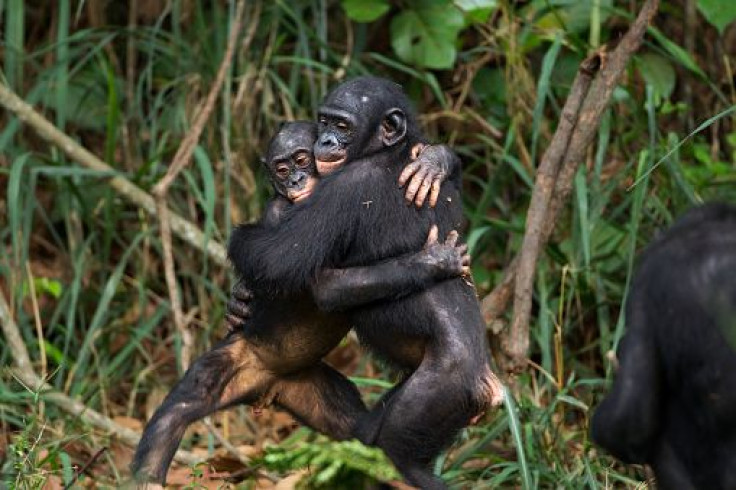Nice Bonobos Finish Last: Our Closest Animal Relative Prefer Bullies Over Nice Guys

Nice guys finish last? Well, in the case of humans that might not be true. Acting like a jerk, for most people, is a big turn-off. In fact, babies as young as 3 months show a preference for warm and kind people. But, in the case one of our closest animal relative, the adage might be true after all.
While most animals hang out with others who are friendly and nice, bonobos tend to pick the jerks to chill with, a new study has found.
A comprehensive study by Duke University has found that bonobos — our closest great ape cousin in the animal kingdom — are more attracted to the mean and unkind ones in the group.
Bonobos are generally peaceful apes. More so than the occasionally violent chimpanzees. Though chimps have a reputation — mainly due to their Hollywood popularity — for being very smart and kind-of goofy, they have a very violent streak. Male chimps have been documented attacking and killing certain members of their pack in sudden rage-fuelled mobs. But, bonobos are very docile, social and laid-back creatures who are rarely violent.
So, why do bonobos prefer the jerks and how did researchers make this finding?
In a study to find out how similar bonobos were to us, Duke University scientists studied adult bonobos at Lola ya Bonobo Sanctuary in the Democratic Republic of Congo.
The team set out to study 24 bonobos by performing two tests. The first one involved showing them animated videos of a Pac-Man-like shape trying to climb a hill. In one of the videos a cartoon creature appears and helps Pac-Man reach the top; in the other video, another animated creature shoves Pac-Man back to the starting point.
Once all the bonobos had watched both the videos a few times, the researchers presented them with two apples —one placed under a paper cut-out of the helpful character and the second under the mean and unhelpful one.
In the other experiment, the bonobos were shown a skit of an actor holding and then dropping a stuffed animal. A second person picked it up and tried to give it to the owner but a third person snatched it away.
Like the first test, apples were offered through the nice guy and the toy snatcher.
In both the studies, the team observed that the bonobos were able to tell the nice guys from the mean ones. But, unlike us humans who would readily trust the nice people and pick the food offered by them, the bonobos mostly chose the jerks.
Before the apes were shown the skit, their baseline preferences were measured; researchers found that the apes’ affection for the toy-snatcher actually increased after the skit.
The researchers also found out the reason for this behaviour. They said that bonobos could perceive rudeness as a sign of social status and were simply trying to be friends with the dominant alpha of their group.
To test this theory, the team showed the bonobos from the test group yet another video, where one cartoon character repeatedly holds onto a coveted spot and prevents other characters from taking it. The apes showed a preference for the character who maintained his space to the one who yielded.
Sticking close to the dominant members of a group gives animals better access to food, mates or other perks, or less chance of being bullied themselves, the team said.
The fact that bonobos prefer bullies and humans don’t suggests that an aversion to jerks is an aspect of human behavior that may have been developed separately.
Scientists say this bias helps humans control behaviour they see as unacceptable by keeping bad behaviour in check through social rejection.
“Humans might have this unique preference for helpers that is really at the heart of why we’re so cooperative,” said Christopher Krupenye, postdoctoral fellow at the University of St Andrews in Scotland.
The study was published on Jan. 4 in the journal Current Biology.
© Copyright IBTimes 2024. All rights reserved.











